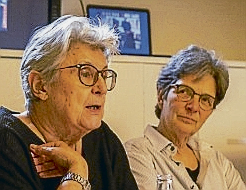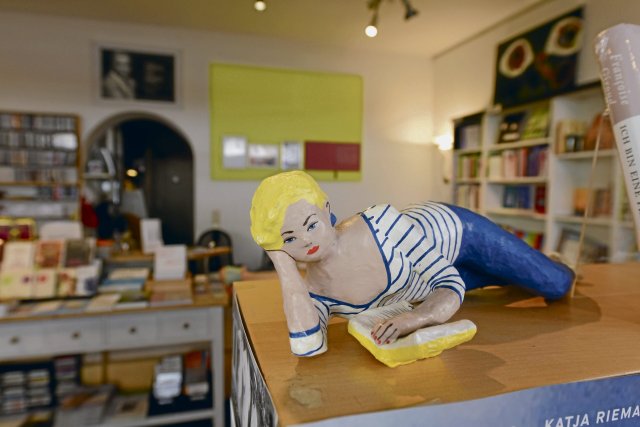That was the women’s bookstore “Lillemors” at Barer Strasse 70 in Munich.
Foto: picture alliance /SZ/Catherina Hess
You ran “Lillemors” for over 40 years. Was it difficult to close the store?
Ursula Neubauer: No. I came out and said: That’s it. I spent more than half my life there and I think I did well. Why should I sit at home in grief and complain? I was even a little relieved. Because the bookstore was a precarious affair. That was also the reason why in the end only me and Andrea remained of the original bookstore collective: no one could or wanted to work for so little money, let alone take on the financial responsibility as managing director. These money worries hung over us like the sword of Damocles all these years. I’m glad that this pressure is gone now.
Andrea Gollbach: I also haven’t regretted the decision for a second. But it was a weight off my mind when it became clear that it wasn’t a nail salon opening, but another feminist bookstore.
Interview

Eva Jünger/City Library
“Lillemors Frauenbuchladen” was founded on November 3, 1975 by Susanne Aeckerle, Ute Geißler, Sabine Holm Mara Kraus, Gerlinde Kowitzke and Monika Neuser – based on the model of the Parisian “Librairie des Femmes”. Ursula Neubauer (*1946) came to the women’s bookstore in 1979, Andrea Gollbach (*1957) had been there since 1981.
The new bookstore that has moved into the old premises is called “Glitch”. The term is mainly used in the gaming scene and roughly means “error in the system”. “Lillemors,” on the other hand, comes from Swedish and means “little mother.” That sounds like a pretty big difference between generations.
Neubauer: Well, the naming back then was more of an emergency baptism. When the founders wanted to register the store with the Chamber of Commerce, it was actually just supposed to be called “Women’s Bookstore.” Then the women heard: “There’s no such thing; we need a clever name.” The decision for “Lillemors” was then spontaneous.
Gollbach: But it’s true: the new bookstore has a different concept and different requirements, it’s no longer a women’s bookstore. That’s why for me it’s not a classic generational change. But feminism is still important to the new people and that gives me hope. You could also just call yourself “Queer Bookstore” and say that that subsumes the entire movement.
They allude to a conflict within the feminist movement: Should women and their realities be the focus? Or should feminism concern itself with completely different discriminated against groups?
Neubauer: »Lillemors« was founded to make women visible in our society. You have to understand the situation at the time: abortion? Forbidden. Own account, go to work? Only with the husband’s permission. We wanted an independent appreciation for women, their unpaid and paid work, and their social achievements. The woman was the focus. And whether men liked it or not, we didn’t give a damn.
However, a man works in the new bookstore.
Gollbach: Yes, it’s no longer a women’s bookstore. But men or trans people and all possible genders can also work in a feminist bookstore. Why not?
Neubauer: The man who works in the new bookstore is actually a professor at the Technical University of Munich. He was a customer and ordered his books from us. When he found out we were closing, he wanted to prevent that.
Among other things, he asked his employees at the university. Now a small team of four volunteers is building the new bookstore – at the historic location of “Lillemors”.
Neubauer: At first I thought: Well, your word in God’s ear. There is a lot of talking when the day is long. But no! He really did it and I give him credit for that.
Under different circumstances – feminism for everyone

Stephanie Schoell
Under different circumstances is Felicia Ewert’s monthly podcast. Conversations about political events that she wouldn’t have to talk about under other circumstances. Ruthlessly intersectional: feminism for everyone. New every month on dasnd.de/umstaende
But it’s about more than just a personality. “Glitch,” for example, also wants to “take men along” in terms of content and explore the question of how men suffer under patriarchy. You weren’t interested in that at the time.
Neubauer: Not at all! We didn’t want to purify or agitate men either. We didn’t care at all. The less attention they got, the better. And they didn’t get any attention from us. They had the women, period. By the way, we can still work on it today because the gap between men and women is still there.
So what do you think about the demands for inclusion and diversity?
Neubauer: I don’t think that’s wrong. But I also expect all groups to become active themselves, to develop concepts, to act politically and to take to the streets. Because that’s what we had to do back then. Nobody told us: “Yes, come on, we’ll take you with us too.” We had to sit on our asses and fight and we got a lot of beatings and insults for it. We endured all of that. Because it was our life.
Was your generation more radical?
Gollbach: Yes! But we were also lucky to have clear enemy images. Today everything is much more diffuse. We were able to be more carefree back then. There were many jobs that made it easy to keep your head above water. Nobody thought about retirement planning. We didn’t think anything about it when we sprayed on shop windows. Today, the slogan is stuck to the window with scotch tape and then removed again for fear of being sued for damages or being recorded in the criminal record. In the 80s we didn’t think about such civilities at all.
You weren’t afraid?
Gollbach: No. There was just great freedom, the common fight on the street, this incredible feeling of togetherness. What was going to happen big? If in doubt, you were given a little warning and had to stand at the shop window with the petrol solution and scratch off the password again. The encounters on the street and in women’s groups made us courageous.
Today people are more likely to meet in Zoom meetings and post slogans on the internet.
Gollbach: There is absolutely nothing wrong with that. But real cohesion doesn’t develop like that. There is a lot of talk about “community,” but you don’t see much of it in real life. What is missing is the real encounter and the emotionality that goes with it. That’s why it may not be true that we were more radical. The circumstances were simply different and we used the scope we had at the time. And really! We had no inhibitions!
What was going on at “Lillemors” in the past?
Neubauer: We were everything at the same time: women’s bookstore, political meeting place, gallery, a place to party. And we were also a contact point. Violence, abuse – the women in the bookstore were able to talk about such taboos quite freely because men were not allowed in. We also provided help with lawyers if someone wanted to get a divorce. Or to doctors for abortions. Fortunately, professional advice centers were founded later.
Gollbach: But the women’s bookstore always remained a place for everyday life help. For example, we had a customer who told me about her deceased canary every two years. And then I listened to it for ten minutes. In a sense, for me this was practical, solidarity-based work with women.
Do you ever feel like giving advice to the new bookstore collective?
Gollbach: No. It was clear to us from the start that we would stay out of it. We are approachable, but we do not make any specifications. If I were to start a bookstore today, I wouldn’t want to have the gray eminences sitting on my shoulder left and right who then roll their eyes or wrinkle their noses and know everything better. Besides, the new group has everything it needs: they’re on fire. They’re looking forward to it. You want to start something new. And they actually still have this early collective idea that we also started with. I think that’s great and I’m keeping my fingers crossed that it works the way you want it to.
demo slot sbobet sbobet judi bola
